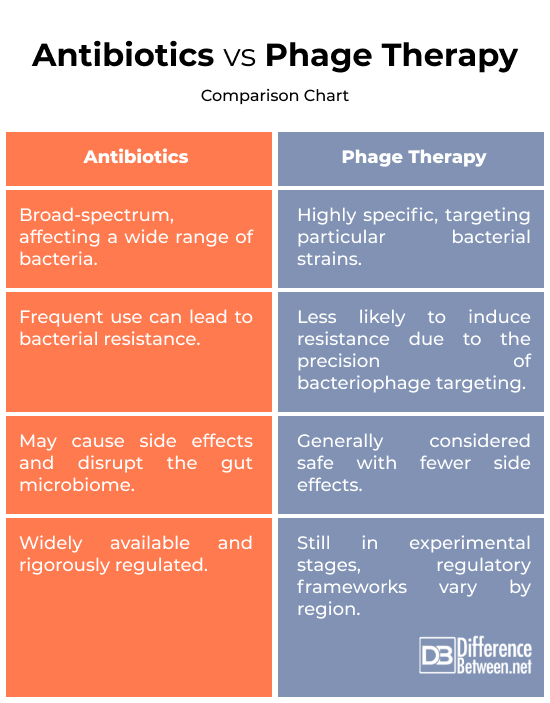Difference Between Antibiotics and Phage Therapy
Antibiotics are medications that have long been used to fight bacterial infections. They have been essential in treating a wide array of infections, from minor skin ailments to life-threatening diseases. But the rise of antibiotic resistance has sparked interest in alternative treatments.
Bacteriophages, or simply “phages,” are viruses that specifically infect and destroy bacteria. They are naturally occurring predators in the microbial world, with each type of phage tailored to a particular bacterial strain.
As antibiotics face increasing challenges, phage therapy emerges as a potentially effective, precise, and adaptable solution in the fight against bacterial infections. In this article, we delve deeper into each and explore some key differences between antibiotics and phage therapy.

What are Antibiotics?
Antibiotics are synthetic or naturally occurring antimicrobial substances that inhibit the growth of bacteria or kill them outright. They are a diverse class of drugs designed to fight bacterial infections. Antibiotics have been a cornerstone of medical practice since the 1928 discovery of penicillin by Alexander Fleming. These drugs have saved countless lives and transformed the treatment of infectious diseases.
However, the overuse and misuse of antibiotics have led to the emergence of antibiotic-resistant bacteria, a global health concern that threatens the efficacy of these drugs.

What is Phage Therapy?
Phage therapy is the practice of using bacteriophages (phages) for the treatment of pathogenic bacterial infections, such as those associated with infectious diseases. Phages are incredibly precise in their action and typically only affect a single strain or species of bacteria, sparing beneficial microbes. It’s a viable option, especially in cases where antibiotics have failed due to drug resistance.
Phage therapy is not a new concept; it was initially explored in the early 20th century and has seen a resurgence of interest as antibiotic resistance becomes more pressing. French microbiologist Félix d’Hérelle coined the terms “bacteriophages” and “phages” in 1918. He was also the first to use phage therapy to treat children with severe dysentery.
Difference between Antibiotics and Phage Therapy
Mechanism of Action
– Antibiotics are substances that inhibit the growth of or kill bacteria. They work by targeting specific molecules or processes that are essential for bacterial survival.
Phage therapy uses viruses called bacteriophages (phages) to target and infect specific bacteria. Phages infect bacteria and then utilize the bacteria’s machinery to produce new phages. Ultimately, they eliminate the bacteria through lysis (bursting).
Specificity
– Antibiotics may affect a wide variety of bacteria, both good and bad. They lack accuracy and may damage helpful microbes in the body, upsetting the natural balance. Phage therapy is highly specific. Each type of phage targets a particular bacterial strain, leaving other bacteria untouched. This makes phage therapy less likely to lead to the development of resistance.
Phage therapy minimizes collateral damage and is especially valuable in cases where preserving beneficial bacteria is crucial, such as in the gut.
Dose
– Generally, antibiotics are given in a single dose or several doses over a short period of time. The dosage must be precise since either too much or too little may be hazardous to the patient or ineffective against the infection.
Given that phages replicate within the body, the dosage is less important than it would be with antibiotics. Nevertheless, it is still important to administer enough phages to effectively kill the infection.
Side Effects
– While antibiotics are generally safe, they can have side effects, such as gastrointestinal issues, allergies, or disruptions to the gut microbiome (the community of microbes that are both helpful and potentially harmful). Some antibiotics can interact with other medications.
Phage therapy is considered safe with fewer side effects because it primarily targets the infecting bacteria. Since it is highly specific, it poses minimal risk to beneficial microbes in the body.
Antibiotics vs. Phage Therapy: Comparison Chart

Summary
In summary, antibiotics are broad-acting chemical compounds, while phage therapy utilizes natural viruses to specifically target bacteria. Phage therapy offers precision, making it a viable alternative to antibiotics, especially in the era of antibiotic resistance. However, it’s worth noting that phage therapy is not a cure-all for bacterial infections. It’s still a relatively new treatment, and there is still much that we do not know about it.
FAQs
Is phage therapy an antibiotic?
No, phage therapy is not an antibiotic. It uses viruses called bacteriophages (phages) to specifically target and infect bacteria, whereas antibiotics are chemical compounds that inhibit or kill bacteria.
Why don’t we use phages instead of antibiotics?
First, phages are much more specific than antibiotics. This means that each phage can only infect and kill a specific type of bacteria. Second, phages are not as stable as antibiotics. Research is ongoing to better understand and utilize phage therapy effectively.
Is phage therapy an alternative to antibiotics?
Yes, phage therapy is considered an alternative to antibiotics, especially in cases of antibiotic-resistant infections. It offers a targeted and precise approach to bacterial infections.
What are the advantages of phage therapy over conventional antibiotic therapy?
Here are some of the advantages of phage therapy over conventional antibiotic therapy:
- Phages are more specific than antibiotics, so they are less likely to cause side effects.
- Phages can be used to treat infections caused by multidrug-resistant bacteria.
- Phages are naturally occurring, so they are not as likely to contribute to the development of antibiotic resistance.
Is phage therapy available in Canada?
Phage therapy is not yet widely available in Canada, but there are a few clinics that offer it. More research is needed to determine the safety and efficacy of phage therapy before it can be widely used.
Is the bacteriophage better than antibiotics?
It depends on the specific infection. In some cases, phage therapy may be a better option, while in other cases, antibiotics may be more effective. However, antibiotics remain important for treating a wide range of bacterial infections and are readily available.
- Difference Between Caucus and Primary - June 18, 2024
- Difference Between PPO and POS - May 30, 2024
- Difference Between RFID and NFC - May 28, 2024
Search DifferenceBetween.net :
Leave a Response
References :
[0]Kuchment, Anna. The Forgotten Cure: The Past and Future of Phage Therapy. Springer, 2011.
[1]Suárez, Pilar García, and Lucía Fernández. Bacteriophages: Alternatives to Antibiotics and Beyond. MDPI, 2020.
[2]Górski, Andrzej, et al. Phage Therapy: A Practical Approach. Springer Nature, 2019.
[3]Sabry, Fouad. Phage Therapy: Alternative to Antibiotics When Superbugs Become Immune. One Billion Knowledgeable, 2022.
[4]Image credit: https://www.canva.com/photos/MADBT6j0uo4-antibiotic/
[5]Image credit: https://www.canva.com/photos/MAEEnGr3oyc-phage-therapy/
